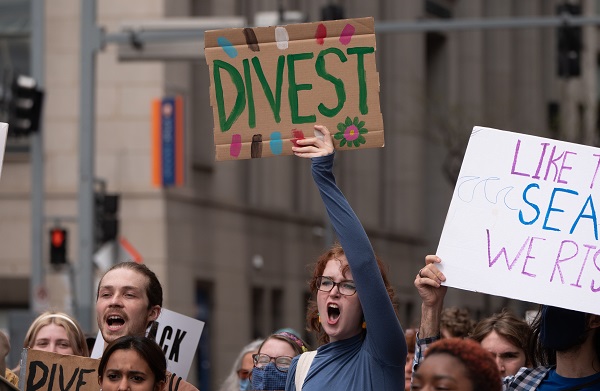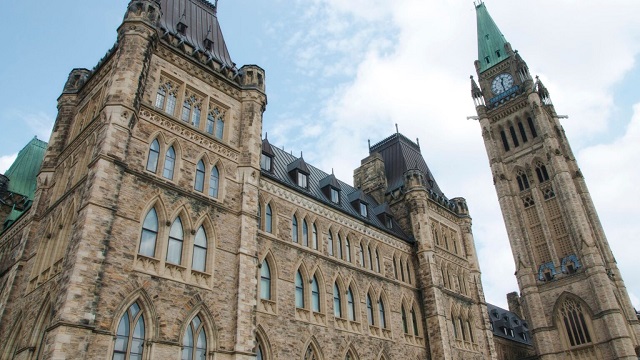National
Bill 96: Quebec public servants now required to make ‘exemplary’ use of French
People take part in a protest against Bill 96 in Montreal, Thursday, May 26, 2022. Quebec’s language law reform is continuing to draw criticism and legal challenges from the province’s English community, a year after it was adopted, as more of its provisions come into effect. THE CANADIAN PRESS/Graham Hughes
By Jacob Serebrin in Montreal
Quebec’s language law reform is continuing to draw criticism and legal challenges from the province’s English community as more of its provisions come into effect Thursday, exactly a year after it received royal assent.
While many elements of the law, commonly known as Bill 96, took effect shortly after it was passed, others were delayed. Those include restrictions on communications with the provincial government in languages other than French, French-language requirements for certain contracts and a requirement that small businesses tell the government how many of their employees don’t speak French.
The Quebec government has described the law as a moderate response to what it says is the declining use of French in the province, particularly in Montreal. Quebec Premier François Legault has repeatedly said that French will always be under threat in North America and he wants to avoid Quebec becoming like Louisiana, where few people speak French despite the state’s French history.
But Eva Ludvig, president of the Quebec Community Groups Network, said the changes taking effect Thursday — and others to follow — will make life harder for English-speaking Quebecers. “We are now seeing the impact of a bad bill, a draconian bill,” she said in an interview. “We see what this really means and the impact it will have on the day-to-day lives of business people, of everyday workers, of students.”
Here are three of the main changes coming into effect:
Civil service to use French “in an exemplary manner”
Chantal Bouchard, spokeswoman for the watchdog that enforces the province’s language laws, says this change means that when on the job, civil servants “must speak and write exclusively in French, except in certain cases.” The rule will not affect access to health care and social services in English, Bouchard said.
In a directive to government agencies, the province’s French Language Department said other exceptions include situations where health, public safety or principles of natural justice require the use of languages other than French.
“We won’t leave anyone in danger,” Jean-François Roberge, Quebec’s Minister of the French Language, told reporters in Quebec City, Wednesday, adding that 911 services will still be available in English.
There are also exceptions for Indigenous people, those who communicated with the government in English before the bill was tabled in May 2021 and people who have the right to English-language schooling in Quebec. Immigrants can also be served in another language, but only for the first six months they live in Quebec.
Roberge said the government will rely on people’s “good faith” when they self-identify as belonging to one of the exempt groups. He said government officials will ask a few questions to establish that people are entitled to receive service in English, but they won’t be issuing anglophone identity cards.
Also starting Thursday, Quebec government websites with English-language content will display banners informing people that the content is only intended for people eligible to receive government communications in English.
Small businesses must report how many employees can’t communicate in French
This requirement applies to businesses with between five and 49 employees, and the data will be made public by the province’s corporate registry.
François Vincent, Quebec vice-president of the Canadian Federation of Independent Business, said the requirement will mean more paperwork for small business owners at a time when they’re already facing a labour shortage.
“I think it will be important for the government to be flexible,” he said. “They should help and support the businesses to get the information the government needs without giving fines.”
Other provisions intended to increase the use of French in small businesses and further restrict the use of languages other than French on signs go into effect in June 2025.
Contracts of adhesion must be presented in French to both parties
These are standard contracts drawn up by one of the parties, such as employment contracts, collective agreements, insurance policies, franchise agreements and telephone service contracts.
As long as a French copy has been presented, people can then decide to request the contract in another language.
Vincent said this measure will cost his members more if they have to prepare two copies of the same contract and pay for translation.
Other changes related to the law — including French-language requirements for students in the province’s English junior colleges — come into effect this fall.
The law faces several legal challenges, including one filed at the Montreal courthouse on Wednesday.
That suit, brought on behalf of six English-speaking Quebecers who say they already struggle to get government services in English and worry the situation will deteriorate as more elements of Bill 96 come into effect, seeks to have many aspects of the bill struck down.
“On the first of June, a lot will change,” said Andrew Caddell, president of the Task Force on Linguistic Policy, the organization that brought the suit, and one of the six plaintiffs.
Caddell told reporters he worries the law’s far-reaching impacts will make English-speaking Quebecers second-class citizens. “We can protect a language and community without eliminating the rights of another,” he said.
This report by The Canadian Press was first published June 1, 2023.
Business
UN plastics plans are unscientific and unrealistic

News release from the Coalition of Concerned Manufacturers and Businesses of Canada
“We must focus on practical solutions and upgrading our recycling infrastructure, not ridiculous restrictions that will harm our health care system, sanitary food supply, increase costs and endanger Canadians’ safety, among other downsides.”
This week Ottawa welcomes 4,000 delegates from the United Nations to discuss how they will oversee a reduction and even possible elimination of plastics from our lives. The key problem is no one has ever figured out how they will replace this essential component of our modern economy and society. The Coalition of Concerned Manufacturers and Businesses of Canada (CCMBC) has launched an information campaign to discuss the realities of plastic, how it contributes massively to our society and the foolishness of those who think plastics can be eliminated or greatly reduced without creating serious problems for key industries such as health care, sanitary food provision, many essential consumer products and safety/protective equipment, among others. CCMBC President Catherine Swift said “The key goal should be to keep plastics in the economy and out of the environment, not eliminate many valuable and irreplaceable plastic items. The plastics and petrochemical industries represent about 300,000 jobs and tens of billions contribution to GDP in Canada, and are on a growth trend.”
The UN campaign to ban plastics to date has been thwarted by reality and facts. UN efforts to eliminate plastics began in 2017, motivated by such terrible images as rivers with massive amounts of floating plastic and animals suffering from negative effects of plastic materials. Although these images were dramatic and disturbing, they do not represent the big picture of what is really happening and do not take into account the many ways plastics are hugely positive elements of modern society. Swift added “Furthermore, Canada is not one of the problem countries with respect to plastics waste. Developing countries are the main culprits and any solution must involve helping the leading plastics polluters find workable solutions and better recycling technology and practices.”
The main goal of plastic is to preserve and protect. Can you imagine health care without sanitary, flexible, irreplaceable and recyclable plastic products? How would we keep our food fresh, clean and healthy without plastic wraps and packaging? Plastic replaces many heavier and less durable materials in so many consumer products too numerous to count. Plastics help the environment by reducing food waste, replacing heavier materials in automobiles and other products that make them more energy-efficient. Many plastics are infinitely recyclable and innovations are taking place to improve them constantly. What is also less known is that most of the replacements for plastics are more expensive and actually worse for the environment.
Swift stated “Environment Minister Steven Guilbeault has been convinced by the superficial arguments that plastics are always bad despite the facts. He has pursued a campaign against all plastics as a result, without factoring in the reality of the immense value of plastic products and that nothing can replace their many attributes. Fortunately, the Canadian Federal court overturned his absurd ban on a number of plastic products on the basis that it was unscientific, impractical and impinged upon provincial jurisdiction.” Sadly, Guilbeault and his Liberal cohorts plan to appeal this legal decision despite its common-sense conclusions. Opinion polls of Canadians show that a strong majority would prefer this government abandon its plastics crusade at this point, but history shows these Liberals prefer pursuing their unrealistic and costly ideologies instead of policies that Canadians support.
The bottom line is that plastics are an essential part of our modern society and opposition has been based on erroneous premises and ill-informed environmentalist claims. Swift concluded “Canada’s record on plastics is one of the best in the world. This doesn’t mean the status quo is sufficient, but we must focus on practical solutions and upgrading our recycling infrastructure, not ridiculous restrictions that will harm our health care system, sanitary food supply, increase costs and endanger Canadians’ safety, among other downsides.” The current Liberal government approach is one that has no basis in fact or science and emphasizes virtue-signaling over tangible and measurable results. Swift noted “The UN’s original founding purpose after World War II was to prevent another world war. Given our fractious international climate, they should stick to their original goal instead of promoting social justice warrior causes that are unhelpful and expensive.”
The CCMBC was formed in 2016 with a mandate to advocate for proactive and innovative policies that are conducive to manufacturing and business retention and safeguarding job growth in Canada.
SOURCE Coalition of Concerned Manufacturers and Businesses of Canada
Frontier Centre for Public Policy
How much do today’s immigrants help Canada?

From the Frontier Centre for Public Policy
Newly arriving immigrants require housing, infrastructure and services right away. But even including other construction workers with the 2 percent who are qualified, working-age artisans, immigrants don’t come close to building the housing they occupy. Along with paying taxes to support new arrivals, oppressive housing and living costs then deter procreation for many would-be parents in the existing population.
The relationship between GDP, productivity, and immigration
It is almost universally accepted that Canada needs immigration and the corresponding population increase to keep the economy going. That is how experts say we are supposed to get economic growth along with improvements in productivity and higher per capita GDP.
But how much of that is true?
First, GDP as a measure of economic activity and national prosperity has limitations. Adjusted for both inflation and the increase in Canada’s population, per capita GDP was in free fall in 2022 and 2023—at minus 2.6 and minus 3.9 respectively.
GDP says nothing about its distribution among the population. Inflation enriches those who own housing and other hard assets, but leaves behind those who do not own them. Notably, with demand overwhelming supply, immigrants’ housing needs and other requirements generate inflation and widen the gap between rich and poor.
It is also necessary to consider what GDP comprises. There is a rough and ready distinction between investment and consumption although the distinction is fuzzy. Broadly speaking, new and more efficient machinery improve productivity, enabling workers to deliver more value for the time they spend working. The consumption part of GDP includes a long list of activities necessary for sustaining life—everything from buying groceries to fixing broken windows, retailing goods made in China, and maintaining the superstructure of government.
Conventional wisdom is that immigration is necessary to make up for the decline in the home-grown population resulting from the birth rate below replacement. But that represents a vicious circle. Much of Canada’s GDP involves building homes and infrastructure, and supporting immigrants—all consumption components. Newly arriving immigrants require housing, infrastructure and services right away. But even including other construction workers with the 2 percent who are qualified, working-age artisans, immigrants don’t come close to building the housing they occupy. Along with paying taxes to support new arrivals, oppressive housing and living costs then deter procreation for many would-be parents in the existing population.
Many employers and politicians promote immigration. That is because immigrants tend to be more industrious and reliable than young home-grown Canadians. Immigrants and their children are generally prepared to work at current pay rates without clock-watching. And there is less pressure to install labour-saving equipment when a pool of people is ready and willing to work for what they get paid.
It’s also necessary to consider that for decades, technology, robots, and more efficient use of labour have been eliminating jobs. Some estimates have it that up to a third of all current jobs will disappear over the next 10 to 15 years. All this said, I look to history and other countries for how changes in population impact productivity and community well-being. In recorded history, the biggest advances in real per capita income occurred in Europe after the bubonic plague killed about half the population between 1347 and 1352. The shortage of labour made workers much more valuable. Feudalism ended and there was a huge surge in wages rates and women’s rights.
In recent times, the population of Japan has been expanding only slowly, and is declining now. In 2023, business capital investments hit a record high at US $223 billion, up 17 percent from the previous year. The question now is whether productivity gains will be enough to sustain its ageing and shrinking population. For Canada, in contrast, per capita business investment, adjusted for inflation and population, has been declining and was sharply lower in 2022-23.
There is another problem. Too many immigrants expect to take advantage of our generous welfare. It may cost $1,000 per person per month to support an immigrant who does not immediately get a job. That must be many times more than it costs to keep that person in a refugee camp.
Of course, Canada has the duty to take in refugees at risk of persecution. And, as Singapore does, employers should be able to hire immigrants for specific top-end jobs where Canada does not have the home-grown expertise.
It is no long-term answer to support people in camps. Troubled countries—Haiti, for example—need security and business investment to enable their self reliance. Countries like Canada need to generate their own wealth to make that possible and not just for the good of our own citizens. This requires diverting GDP back to the non-residential business investment that is the lifeblood of a healthy and sustainable economy.
Colin Alexander’s degrees include Politics, Philosophy, and Economics from Oxford. His latest book is Justice on Trial.
-

 Brownstone Institute2 days ago
Brownstone Institute2 days agoA Coup Without Firing a Shot
-

 COVID-192 days ago
COVID-192 days agoWHO Official Admits the Truth About Passports
-

 Energy2 days ago
Energy2 days agoAnti-LNG activists have decided that they now actually care for LNG investors after years of calling to divest
-

 Freedom Convoy2 days ago
Freedom Convoy2 days agoOttawa spent “excessive” $2.2 million fighting Emergencies Act challenge
-

 Brownstone Institute2 days ago
Brownstone Institute2 days agoIs the Overton Window Real, Imagined, or Constructed?
-

 Censorship Industrial Complex1 day ago
Censorship Industrial Complex1 day agoDesperate Liberals move to stop MPs from calling Trudeau ‘corrupt’
-

 conflict1 day ago
conflict1 day agoCol. Douglas Macgregor torches Trump over support for bill funding wars in Ukraine and Israel
-

 Frontier Centre for Public Policy1 day ago
Frontier Centre for Public Policy1 day agoThe end of Canada: The shift from democracy to totalitarian behavior in the ‘pandemic era’



